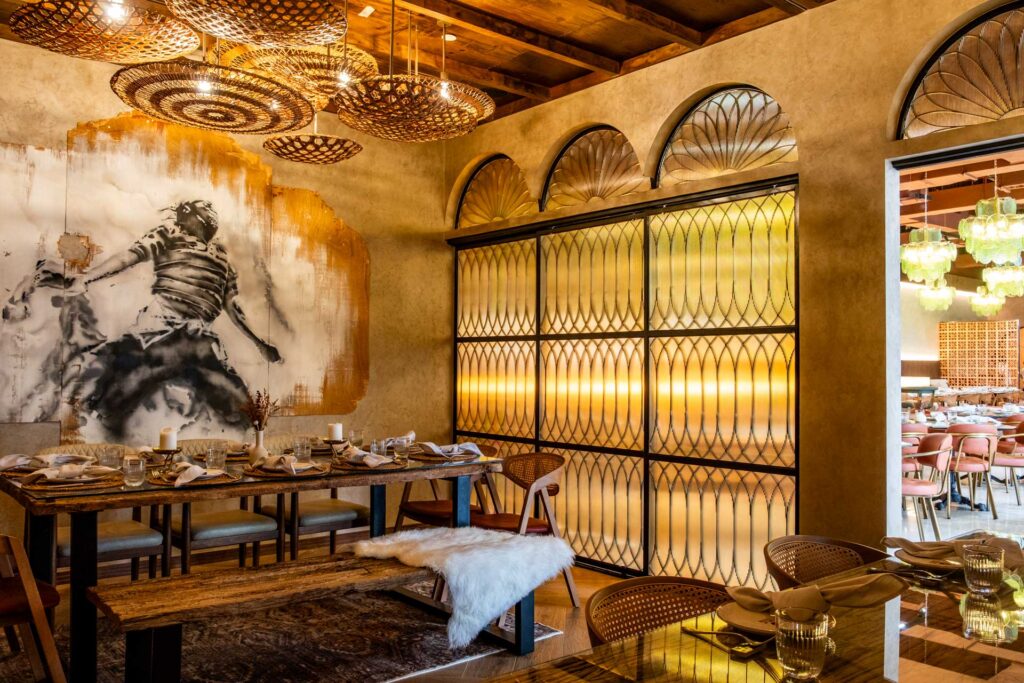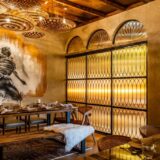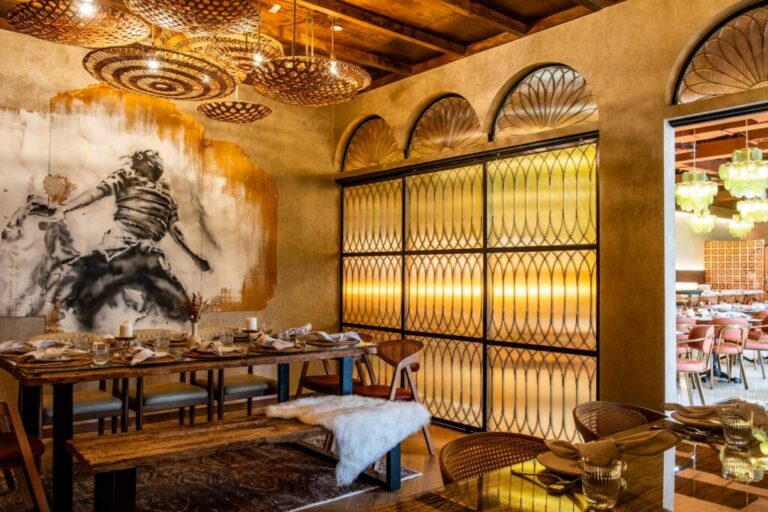Word of her handmade noodles and crispy chicken karaage soon spread, and soon enough, she was hosting sold-out meals at her home six nights a week.
Feature image from Girl and the Goose
For anyone who has ever dreamed of being a professional chef – or indeed, running their own restaurant – but didn’t go to culinary school, the story of self-taught chef Neha Mishra, a ramen master and founder of Kinoya, is a dream come true. In the years prior to 2020’s COVID-19 pandemic, the Indian-born, Dubai-raised former film producer launched a supper club called A Story of Food, gaining fame for handmade noodles and karaage chicken. When COVID-19 hit, she adapted with DIY meal kits before opening izakaya-style Kinoya in 2021. The restaurant earned 7th in World’s 50 Best Restaurants MENA 2023, expanded to Harrods London, and secured a Bib Gourmand by 2024 – a true Dubai foodie fairytale.
In Dubai’s crowded F&B scene (13,000+ venues), supper clubs thrive despite higher prices and communal seating – offering exclusive, authentic connections in our fast-paced world. This was true for Girl and the Goose, launched in 2019 by self-taught chef Gabriela Chamorro to share Central American flavors. After cabin crew work and training at elite institutions (Culinary Institute of Barcelona, MAD Academy, stages at Geranium and Kol), her real education came from hosting 5,000+ supper club guests and kitchen takeovers at venues like Fairmont The Palm and BOCA DIFC. “These experiences taught me to create more than just a meal,” says Chamorro, who recently moved her supper club’s actual table into Anantara Downtown Dubai.
Although her supper club was the perfect testing ground for what would someday become one of Dubai’s most exciting new dining venues, Chamorro hadn’t initially had any clear expectations on where her supperclub would take her. “It started as a passion project; a way to cook, share, and bring people together over the flavors of the region I call home. But as the supper club grew, one thing became clear: there was a real appetite for Central American cuisine in Dubai. Guests weren’t just enjoying the experience; they were coming back, bringing friends, and asking where they could find these dishes beyond our private dinners and the walls of my home. That’s when the idea of a permanent space began to take shape.”
Chamorro reflects on Girl & The Goose’s transformation from home dining to cultural showcase, fueled by word-of-mouth growth that expanded into pop-ups and brand collaborations. The turning point came when Rosy Hospitality founders Ziad and Rowan Kamel attended a supper club dinner. “From our first conversation, we shared a passion for meaningful dining experiences,” Chamorro recalls. “They provided the infrastructure and expertise I needed to scale my vision while preserving its essence – that’s when I knew it was time to leap.”
Chamorro’s and Mishra’s stories are inspiring, and are among a growing handful of Dubai-based supper clubs that have successfully transitioned into brick-and-mortar restaurants, each doing so in their own unique way. Al Naqa Lao Kebab House – a humble restaurant found in Motor City’s Neighbourhood Food Hall, whose juicy meats, homemade cola, and unique flavors that are nothing short of mighty – began its life as a supper club called The Legendary Naga, named after a Buddhist tale that had inspired its chef, Aphisith Phongsavanh (popularly known as chef AJ). Like Chamorro, Phongsavanh had not initially started with concrete dreams for a restaurant.
After The Legendary Naga’s boom in popularity, Phongsavanh was approached by the food hall’s operator to open up a concept amongst its other venues. “I wanted to launch a Lao concept that showcased many wonderful dishes, but the owner decided against it because he thought it was too close to Thai food, as there was another venue [there] that offered some Thai dishes. I found it strange, because [to me], Lao food is very different from Thai food. [But] I obliged, and chose to create a concept that introduced people to the flavours and techniques of Lao food in a relatable way. This is how Al Naqa was born: Southeast Asian kebabs,” he explained.
Since making the leap to their own restaurants, both Chamorro and Phongsavanh have welcomed new pros and cons. Phongsavanh explains: “With a restaurant, the stakes are higher, the team is bigger, and the operations are more complex. Now, I’ve had to delegate some of these tasks to the team, which is an adjustment, but I’ve learned that asking for help is essential. That kitchen was 9 square meters, and now, I’m running a kitchen of 122 square meters, serving over 135 covers! While the one-table experience was uniquely intimate, we’ve designed a live kitchen bar at the restaurant that seats 8-10 guests and allows for a different kind of close-knit connection.”
A unique perspective
Both chefs agree that running a supper club can teach you unique lessons for running a restaurant someday, from a unique and unfiltered connection to guests, to the chance to adjust dishes in real time, as well as a chance to develop a seasoned approach to hospitality and service. “Cooks and chefs that have only worked in commercial kitchens are usually relegated to the kitchen, providing no interaction with guests. Running a supper club allows the operator to put on many hats, learning how to speak and entertain while executing service. It’s the epitome of front of house combined with back of house, in a smaller setting,” Phongsavanh explains.
Supper club founders can learn from the success stories of supper clubs-turned-restaurants and their chefs. Phongsavanh advises understanding personal goals and understanding the challenges of running a restaurant. He suggests that opening a restaurant is not a simple decision, as it requires long hours and no days off. Chamorro advises staying true to culinary roots and maintaining authenticity. Diners seek stories, feelings, and a sense of belonging, and creating an experience with atmosphere, hospitality, and details is crucial. Chamorro dreams of expanding her brand to increase Central American cuisine presence in Dubai and beyond. Phongsavanh aims to create meaningful relationships, create art with purpose, and give back to his communities by building positive growth. He dreams of having the freedom to write, paint, make music, and cook at home, and expanding his brand to include multiple casual and fine-dining concepts.






